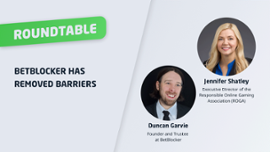Q: BetBlocker is now entering the North American market in earnest, backed by some of the biggest names in the industry. Why is this an important step forward for the charity, and what is the endgame here? Duncan: With half of the US population, and 60% of the Canadian population engaging in gambling each year, hundreds of millions of people on the North American continent gamble. Even by conservative estimates of harm, that’s millions of people who would benefit from support managing their access to gambling.North America represents some of the most mature gambling markets in the world and with mature gambling markets comes an industry that is ready to invest to develop sustainable systems and tools to support people to minimize harm and engage with gambling in a safe fashion.Historically, the bulk of BetBlocker’s funding has come from the European markets, and consequently the lion’s share of our resources and attention have been focused in these markets. The ongoing evolution of the funding system in the UK has created uncertainty about how future funding will look, and that has brought into sharp focus the need to diversify BetBlocker’s funding channels.BetBlocker has been very fortunate to have been quickly embraced by early adopters in the North American markets - namely ROGA, Draftkings and Bally’s – which has quickly accelerated our reach, resulting in around a hundred activations every day across the continent.Our strategic objectives with this move are two-fold: to ensure that BetBlocker’s support is easy to find for the hundreds of millions of gamblers across the continent and to ensure the security of the project by building relationships with a wider range of stakeholders across new markets. Q: In terms of potential success, why do you think BetBlocker will provide better results than any alternative on the market right now? Jennifer: BetBlocker, as a free and anonymous blocking software that can be easily accessed by players, removes many of the most significant barriers for those seeking support. By blocking access to over 100,000 websites and apps—including a growing number of unregulated operators—it offers unmatched, comprehensive protection for anyone seeking to limit their gambling activities. This combination of accessibility and scope makes BetBlocker an especially effective resource, and we look forward to continuing to increase its visibility in the U.S. through our partnership. Duncan: BetBlocker operates as a charity rather than a for profit business. This provides us with a number of significant benefits when it comes to providing blocking software:i) Cost – Unlike other blocking softwares, BetBlocker is free to anyone, anywhere. Whilst a fee of a few dollars a month may not seem like a lot to many readers, the value of money is very much dependent on how much of it you have. Many of the people that need the support of blocking software have reached a crisis point with their gambling. They are already in challenging financial circumstances. Any price wall can end up acting as a barrier to engagement that reduces uptake.ii) Anonymity – One of the most significant barriers for people when it comes to seeking help with gambling harm is the stigma that can be associated with problem gambling. As BetBlocker does not need to collect any payments from users, we do not need users to register with us to access the service. This means that BetBlocker users can access support entirely anonymously. There’s no need for them to provide us with any personal information, removing another significant barrier for users.iii) Accessibility – BetBlocker is available on more platforms, and in far more languages, than any other blocking software. While we constantly strive to make the set-up process as straightforward as possible, the nature of blocking software means that the user has to manually change some system settings during activations. These changes cannot be automated. When a user is confronted with instructions in a language that they either aren’t comfortable with, or don’t speak at all, this can create an insurmountable barrier to accessing support. By prioritising the translation of our service, we’ve ensured that a wider range of communities can access the support than other blocking softwares cater to.iv) Flexibility – As BetBlocker does not require a subscription, our blocking profiles do not need to adhere to the subscription renewal cycle. So rather than having to chunk users’ options into months of years, we can offer users the flexibility to select blocks of any length. Currently users can select from 24h right up to 5 years, but an update that will be released shortly will allow for hours up to any length the user prefers.BetBlocker has removed barriers to engagement that commercial blocking software services cannot or will not, and this more socially conscious approach ensures that that players find accessing support far easier and feel more secure when doing so.But over and above removing barriers to uptake, BetBlocker also offers functionality that simply isn’t available via any of the alternative commercial blocking softwares. Our Scheduling tool offers users the ability to plan their block in advance. This option allows BetBlocker to be customized to the user’s needs, functioning as a harm minimization tool alongside a crisis management strategy. Q: What remains as key challenges for operators to protect consumers, and can ROGA’s members actively pursue a policy that prevents excessive gambling and spending on behalf of consumers? Jennifer: A major challenge is that traditional self-exclusion options are usually restricted to certain platforms or regions, resulting in substantial gaps, and players can often evade these safeguards by switching operators or crossing state lines. That’s why ROGA is spearheading the creation of a shared data clearinghouse, which will enable multi-state, multi-operator self-exclusions seamlessly across all ROGA member platforms. This is a significant step forward that will expand protections to better support those who wish to restrict their gaming behavior. Of course, we recognize that even with these advancements, unregulated and offshore operators still pose a risk as they fall outside formal self-exclusion measures. That’s where BetBlocker plays a crucial role, giving individuals the power to block access to unlicensed sites directly at the device level. Ultimately, a comprehensive strategy that combines robust national systems, new technologies, and ongoing collaboration across the industry will be essential to providing player protections. Q: Responsible gambling often requires a balance between consumer protection and commercial interests. From BetBlocker’s standpoint as a tool provider, and from ROGA’s standpoint as an association setting industry standard, how do you see the industry working together to align these priorities in practice? Jennifer: At ROGA, we believe that player well-being and commercial success are not mutually exclusive; in fact, they are deeply interconnected. Responsible gaming measures can help build the foundation for long-term, enjoyable customer experiences within their limits. ROGA plays an essential role in this process by creating evidence-based best practices that can drive the industry forward. We recently introduced our new Guidelines for VIP Player Program Management, which provide a framework for structuring these programs through a responsible gaming lens. This framework includes proactive monitoring of player activity, tailored responsible gaming communications, and dedicated training for VIP hosts to supplement existing responsible gaming training. We look forward to sharing more best practices in the future and continuing to work with partners like BetBlocker to demonstrate the critical role responsible gaming plays in the industry's sustained success. Duncan: There is unquestionably a balance to be struck around this issue, but it really comes into play when we are discussing direct interventions, i.e. where an operator imposes a restriction on the players ability to access gambling services.BetBlocker offers a different kind of protection. One that empowers players to take control of their own access to gambling. Whether that means taking a complete break, or using the Scheduler to restrict during windows of known vulnerability. This makes BetBlocker an easy win for the industry. There’s no need for the operator to intervene. Just make sure the player is aware of the available support and let them make their own decisions. Q:BetBlocker has seen strong adoption in Europe. What lessons from that experience are you applying to North America, and where do you see the biggest differences in terms of market needs?D: As unexpected as this response may be, I don’t see any market as fundamentally different when it comes to gambling harm. Gambling addiction is no different in the US or Canada than it is in the UK, Poland, Argentina or Nigeria. The core service that we deliver does not need substantial changes.Where changes can be beneficial are where we’re engaging with communities that have different language needs, meaning new translations result in significantly improved access, or where we can co-brand with regional stakeholders to reinforce consumer confidence in the service, and communicate that BetBlocker is not just available to the user, it’s specifically FOR the user. Q: How do you gauge the impact this partnership will have on US player bases? What metrics or indicators will you be tracking to measure success? Can you measure the real player protection impact BetBlocker has had, and do you have some estimates as to what adoption rate you are looking for? Jennifer: Our primary goal is to increase awareness, enabling players who choose to restrict their play to do so using BetBlocker. This collaborative approach not only makes blocking tools more visible and accessible but also expands support options to players across the US market, especially those using unlicensed sites, who may not have access to traditional responsible gaming tools and problem gambling support resources. Duncan: From BetBlocker’s point of view the most important indicator of success is user uptake. When we remove the barriers of paywalls and the need to register, the biggest challenge for any blocking software is ensuring that players are aware of the support that is available to them. There are millions of people out there who could benefit from our support that simply don’t know about us. BetBlocker sells itself as long as people know about us.As a charity we have a limited budget. We don’t have the resources to run huge marketing campaigns. So we absolutely rely on other stakeholders in the sector to help signpost us. ROGA and its membership has a megaphone that BetBlocker could only dream of. This partnership unquestionably should see significant increases in the number of US users activating a BetBlocker restriction. So we’ll be watching those figures carefully. Q:BetBlocker is unique in being a free tool, and you recently ran a LinkedIn poll about whether that model should change. Most of your followers agreed it should stay free. Given the lack of monetization opportunities, how do you ensure the project’s long-term sustainability?Duncan: I’ve always strongly believed that support for gambling harm should be accessible without charge – price walls between users and support both exacerbate the principal marker of harm and supress user engagement – and when we surveyed our followers about this, 86% of respondents agreed with that position. So keeping the service free for everyone is one of the foundational cornerstones that our project is built upon.This means that we have to invest substantial amounts of time and resources building relationships with people like Jen and organizations like ROGA, convincing them that BetBlocker is delivering support that people need and that helping to fund our project is investing in a better gambling industry. It means constantly working to make people aware of who we are and what we’re doing. It’s hard work. But because we place so much emphasis on building relationships, we end-up with really enthusiastic cheerleaders all across the sector who champion our work and advocate for us wherever they can. We couldn’t ask for better partners and supporters. We’re very very lucky in that regard.You are correct that not charging users removes an easy way of funding the project. But I believe that the benefits of offering a free service to the people who need blocking software far outweigh the additional challenges of having to find alternative ways to fund the project. Q: What do you think still poses a challenge for the wider adoption of tools such as BetBlocker? Jennifer: One of the ongoing challenges is raising awareness and overcoming stigma. Many players who could benefit from tools such as BetBlocker may be unaware of their availability or may feel reluctant to seek support due to concerns about privacy or fear of judgment. That’s why our partnership is dedicated not only to increasing the accessibility of BetBlocker, but also to actively promoting it and normalizing its use as a proactive and responsible decision for players who need to restrict their play. Duncan: Without question, messaging. Historically, harm minimisation signposting has focused on the detrimental impact that gambling can have on peoples lives’. There’s no question that this is valuable messaging and absolutely necessary to help us reach people who need support now. But when we’re targeting people who already need support, we’re reacting to a crisis rather than preventing it.If we want to prevent people reaching a crisis point, we need to reach them earlier. Before they identify as being harmed by gambling. We need to work to change cultural attitudes towards engaging with gambling. To create social norms around healthier play and engagement with safer gambling tools, like deposit and wager limits, and BetBlocker.If we’re going to reach players before they identify as harmed by gambling, we’re going to have to communicate in a way that actually engages them. The average gambler does not view themselves as harmed by their gambling, so when they see messaging talking about harm they disengage. We need to create messaging that won’t switch these users off. That engages them and encourages them to adopt healthy approaches to managing their gambling.When we start effectively reaching players before the crisis, that’s when we’ll have the greatest impact in terms of reducing harm. I’d far prefer to see BetBlocker users engaged with our Scheduler to manage their access to gambling, than having to put in place a complete block because they’ve reached a point where they have to abstain entirely. But we’ll only achieve that if we speak to people in a way that they’ll listen to. Q: Looking five years ahead, what does success in responsible gambling in the United States look like to you, and do you see ROGA and BetBlocker as major drivers of that change? (Both) Jennifer: Success in responsible gaming means further integration into the player experience and personalization of resources and tools. We must meet all players where they are to offer personalized information, insights, and support that are relevant to their unique gaming behaviors and preferences. Providing this type of information to all, not just those engaging in potentially risky behavior, will be essential to continuing to enhance the overall player experience. We're already seeing that players are interested in personalized data that provides insights about their play. FanDuel's My Spend tool was used by half of all users during the 2024-2025 NFL season, and DraftKings' My Stat Sheet has seen over 21 million visits since 2023. And we look forward to continuing our relationship with BetBlocker as it expands its tool to offer more personalized resources and tailored support for players. Along with promoting these valuable tools and resources, ROGA will continue to invest in research that helps guide their continued improvement. Currently, ROGA is finalizing research focused on increasing engagement with existing RG tools. These combined efforts will help continue to improve the integration of responsible gaming into the overall player experience. Duncan: I founded a charity that provides free blocking software, so I obviously have a favourable view of the impact of blocking software. But I’m reluctant to over state the benefits of blocking software. BetBlocker is not a magic bullet for gambling harm. It is a tool. One that should form part of a far wider toolkit.The partnership between BetBlocker and ROGA is significant and has the potential to ensure that millions of additional Americans are aware of the support that is freely available to them. It offers the chance to have a positive impact on a huge number of lives.But as far as drivers of major change, I see BetBlocker as part of a wider strategy to deliver change, rather than as a driver in its own right.My hope is that the sector as a whole works together to reach players earlier and pushes for a societal change in attitudes, similar to the one that resulted in seatbelt usage, where more gamblers think about how to keep their gambling safe and fun before they play, rather than waiting until after the problem has occurred to seek help.
NORTH-AMERICA/INTERVIEWS

Back to Articles
BetBlocker breaks down the barriers that commercial blocking software either cannot or refuses to tackle.
Q: BetBlocker is now entering the North American market in earnest, backed by some of the biggest names in the industry. Why is this an important step forward for the charity, and what is the endgame here?
Published on September 11, 2025





























